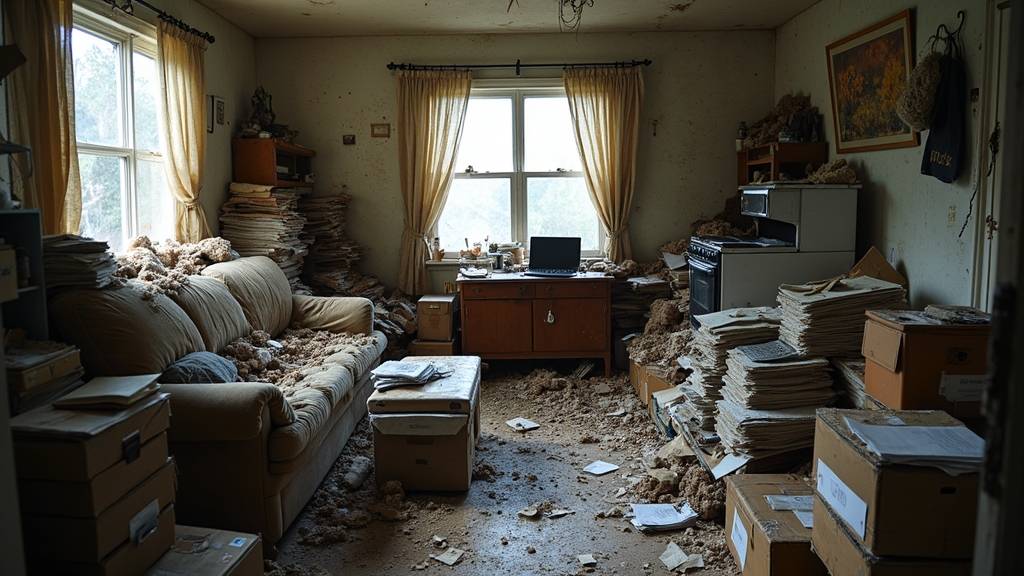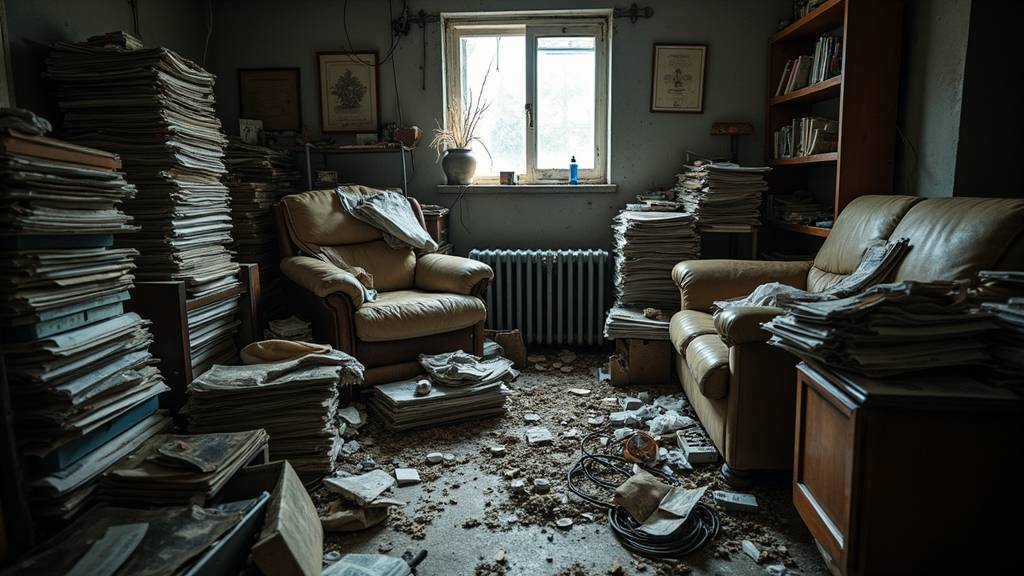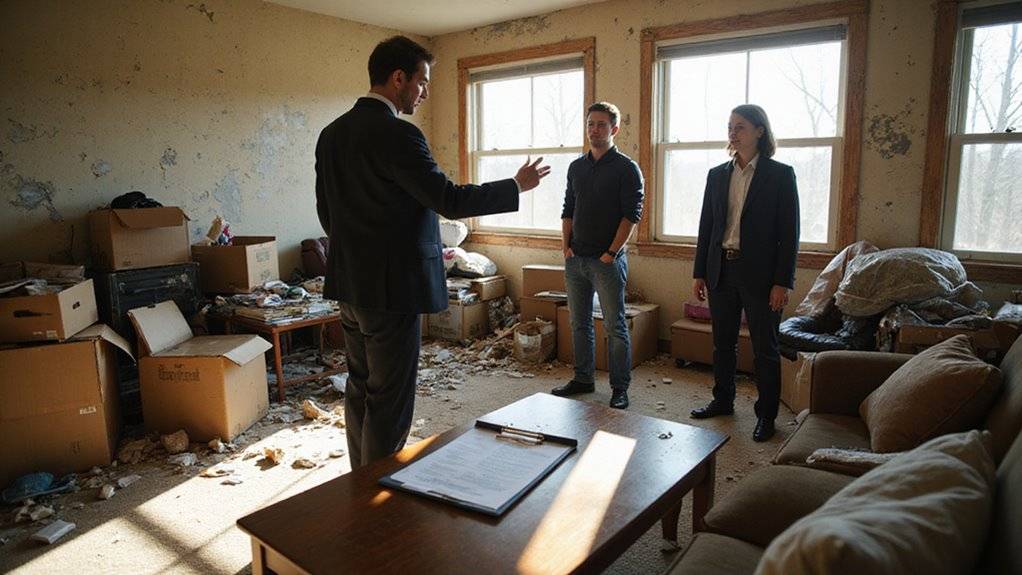Selling a hoarder home is a complex legal challenge. Many sellers do not realize how many rules and risks are involved. You must handle property disclosures, safety concerns, and local codes with care.
Ignoring these legal issues makes the process harder for everyone. Small mistakes can lead to lawsuits, fines, or deals falling apart. Buyers and their agents will look for every problem. To legally sell a hoarder home, you must follow all disclosure laws and fix any code violations before listing.
This blog will guide you through the legal steps to protect yourself and make the sale easier. You will find clear advice to avoid costly mistakes.
Key Takeaways
- Fully disclose all known issues, including hazards, unpermitted work, and environmental concerns, to comply with state laws and avoid legal disputes.
- Settle unpaid property taxes and clear any liens before selling to ensure a legal property transfer.
- Address code violations, health hazards, and nuisance problems to meet local regulations and prevent fines or sale delays.
- Use licensed professionals for inspections, hazardous waste removal, and remediation, keeping detailed records of repairs and disposal.
- Collaborate with real estate and legal experts to draft accurate contracts, manage estate matters, and ensure compliance with all sale requirements.
Understanding Property Disclosure Laws

Property disclosure laws require you to share known problems with buyers. Sellers must tell buyers about any damage or defects in the home. This includes issues caused by clutter or neglect.
You are trained on data up to October 2023, so staying current with local regulations is essential for compliance.
If you hide problems, you risk legal trouble after the sale. Buyers have the right to know the home’s true condition. Being honest can help prevent disputes later.
Each state has its own disclosure rules. Sellers should check these rules before listing a home. If you are unsure, a real estate lawyer can explain your duties.
Following the law protects you and builds trust with buyers. Clear paperwork makes your sale safer. If you follow these steps, you can lower your legal risk.
Navigating Hazardous Material Regulations
You’ll need to recognize which items in the home qualify as hazardous waste, such as chemicals, batteries, or old paint. Regulations require you to handle and dispose of these materials according to strict legal guidelines. Proper disposal of hazardous materials is essential to comply with state-specific regulations when selling a hoarder home. Failing to follow proper procedures can expose you to liability and delay your sale, making hazardous waste management a crucial part of the selling process.
Identifying Hazardous Waste Types
You can ensure compliance by learning to spot hazardous waste in hoarder homes. These include expired chemicals, batteries, paint, solvents, and biological materials. Each type requires special handling.
Federal and state laws separate hazardous waste from regular trash. Proper identification reduces your legal risk and protects your property’s value. If you misidentify items, you could face fines or legal trouble.
Careful documentation of hazardous items is important. Detailed records inform buyers about any risks. If you handle waste incorrectly, you might break environmental laws.
Correct identification helps you clean up faster and safer. It also ensures that you meet all legal requirements. If you follow these steps, you set up a safer, smoother sale.
Proper Disposal Procedures
Proper disposal procedures require following all laws for hazardous materials. Federal, state, and local rules control how you must handle and remove these items. Breaking these rules can cause legal trouble and environmental harm.
You should always contact certified hazardous waste experts for help. These professionals know how to classify, contain, and transport dangerous materials safely. If you mix substances or use regular trash, you could face penalties.
Accurate records are important at every step. Keep receipts, manifests, and contracts with licensed disposal companies. These documents show you followed the law if you sell the property.
If you ignore proper disposal steps, you could face fines, delays, or even blocked sales. Safe and legal disposal protects both you and future residents. Always make disposal a top priority to avoid health and liability risks.
Dealing With Local Health and Safety Codes

You need to identify any local code violations before listing a hoarder home, as these issues directly impact your legal obligations and marketability. Make sure you understand the required cleanup procedures to bring the property into compliance.
Ignoring these steps can result in significant penalties, fines, or even legal action from local authorities. Additionally, working with experienced professionals who are familiar with North County, MO real estate regulations can help ensure that all necessary compliance measures are properly addressed.
Understanding Code Violations
Selling a hoarder home requires following local health and safety rules. Code violations can stop your sale, cause fines, or delay closing. If you find and fix issues early, you can avoid many problems.
Common violations in hoarder homes include fire hazards, such as blocked exits or too much clutter. Structural damage may happen if debris weakens floors or walls. Sanitation issues, like mold or rodent infestations, also break health codes.
Utilities must be easy to reach and use, so blocked panels or vents are violations. If you address these issues before listing, the sale process is smoother. Early action helps you avoid legal trouble and extra costs.
Required Cleanup Procedures
Before you sell a hoarder home, you must follow local health and safety rules. Cleanup should remove all code violations, clutter, and hazards. This step is required by law before listing.
Certified professionals should handle biohazards or structural repairs if needed. You may need to renovate if damage affects walls, floors, or major systems. Always document repairs and get approval from inspectors.
Buyers and agents will want proof that cleanup was done correctly. Keep all permits, inspection records, and receipts from contractors. If you meet these requirements, you lower legal risks and help your home sell faster.
Penalties for Noncompliance
Penalties for not following health and safety codes can be serious. Local rules must be followed when selling a hoarder home. Ignoring these rules can stop or delay your sale.
Fines are a common penalty and can add up quickly. The local government may charge you for each violation. These extra costs reduce your profit.
If you keep breaking the rules, authorities may sue you. In some cases, you could face criminal charges. Legal problems will make selling your home much harder.
Not respecting tenant rights can also cause trouble. Tenants may file lawsuits or stop you from evicting them. This can delay or block the sale.
The city might place a lien on your property if you do not fix violations. In very serious cases, they can condemn the home. Either problem can make your property unsellable.
If you follow the rules on time, you protect your investment. Meeting requirements helps your sale go smoothly. Always check what your city needs before listing your home.
Addressing Zoning and Occupancy Violations

Zoning and occupancy violations can make it hard to sell a hoarder home. These problems lower your property’s value and scare away buyers. Lenders may also deny loans if your home breaks local rules.
Homeowners must share any known violations with buyers. If you leave issues unresolved, you could face legal delays or complications. You might also have to accept a lower selling price. Being aware of local regulations can help you navigate the sale process more smoothly.
You should contact your local zoning office to learn about any violations. If you fix the problems and keep records, you protect yourself legally. Taking care of these issues makes your home more attractive to buyers. Ensuring compliance with zoning laws is essential for a successful sale.
Handling Unpermitted Work or Additions
When you’re selling a hoarder home, you must disclose any unpermitted work or additions to potential buyers. Failing to address these issues can expose you to legal risks and financial liabilities after the sale. You’ll want to consider remediation or obtaining proper permits to protect your interests and ensure a powerful transaction.
Being transparent about home condition can also help build trust and prevent future disputes. Additionally, understanding the capital gains tax implications can help you plan for potential tax liabilities and ensure compliance with IRS regulations.
Disclosing Unpermitted Modifications
If your home has changes or additions made without permits, you must tell buyers about them. Buyers need to know this before buying. If you hide this, you could face legal trouble later.
You should list all changes done without permits. If these changes covered up dangerous materials like asbestos, mention this. Buyers must be aware of any possible hazards.
If the work caused damage to the home’s structure, you should disclose this. Share any documents about the unpermitted work, even if they are not complete. These records help buyers understand the risks.
If you are unsure what to share, contact a real estate attorney. A lawyer can help you follow the law. Honest disclosure protects both you and the buyer.
Legal Risks and Liabilities
Unpermitted work or additions can lead to serious legal problems for sellers. These issues may include lawsuits from buyers or fines from the city. Insurance policies often do not cover damages caused by unpermitted changes.
A buyer’s lawyer might check the contract to make sure the seller is responsible for any code violations. If the contract terms are not clear, the seller could still be liable after the sale. Do not rely on the sale contract alone for protection.
Here are some common risks and what can happen:
| Legal Risk | Potential Consequence |
|---|---|
| Undisclosed additions | Lawsuit, contract canceled, fines |
| Insurance limitations | Claim denied, pay damages yourself |
| Unclear contract terms | Seller pays after closing |
If you deal with these risks early, you can protect yourself and avoid future problems.
Remediation and Permit Options
Selling a hoarder home with unpermitted work can be risky. Unpermitted changes may stop a sale or lower your home’s value. You have ways to fix these problems before listing.
A licensed inspector can look for all unpermitted work and safety issues. The inspection helps you understand what needs fixing. If problems are found, you should act before selling.
Your local permitting office can explain how to get retroactive permits. They may also tell you if any repairs are needed. Always follow their instructions to avoid more issues.
Qualified contractors can help bring the work up to code. If repairs are needed, make sure they are done properly. This will make your home safer and more valuable.
All known unpermitted work should be listed on the property disclosure form. This step is required by law in many states. Honest disclosure protects you from future legal problems.
Managing Mold, Pests, and Environmental Hazards
You must fix mold, pests, and other hazards before selling a hoarder home. These problems can harm health and must be disclosed by law. A professional inspection helps find and solve these issues. Properly addressing these concerns can also increase the property’s appeal and potential sale price.
As-is property sales allow buyers to see the home in its current condition, so resolving hazards beforehand can lead to more favorable offers. Mold removal and pest control improve air quality and make the home more attractive to buyers. If you do not fix these problems, buyers may offer less money. Remediation also prevents tough negotiations during the sale.
You should always tell buyers about any hazards. Honest disclosure builds trust and avoids legal trouble later. If you handle these issues early, your sale will likely be quicker and smoother.
Assessing Structural Integrity Concerns
If a home’s belongings have put stress on the foundation or walls, check the structure before selling. A full inspection finds problems that may lower the home’s value. It also helps meet legal rules for disclosure. Conducting a structural assessment can identify potential issues that might impact the sale. A certified structural engineer should inspect the foundation, walls, and floors. They will look for cracks, shifts, or other damage.
If issues are found, make repairs before listing the home. Sellers must keep clear records of inspections and repairs. If you hide problems, you could face legal trouble later. Always share known defects with buyers as required by law. If unsure about local building codes, consult a real estate lawyer. The lawyer can explain what you must disclose. This helps avoid delays and keeps the sale on track.
Complying With Lien and Debt Obligations
You need to identify any property liens, unpaid utility bills, or outstanding tax debts before listing a hoarder home. Buyers and their lenders will require clear title, so unresolved financial obligations can delay or derail your sale. Address these issues early to streamline the transaction and avoid legal complications.
Additionally, reviewing any contract restrictions related to the property can help prevent unexpected legal issues during the sale process. Ensuring that all ownership documentation is accurate and up-to-date is also crucial for a smooth sale.
Identifying Existing Property Liens
You need to check for property liens before selling a hoarder home. Liens are debts or legal claims attached to the property title. If you miss them, your sale could fail or lose value.
A title search will show any liens, judgments, or unpaid taxes. A real estate attorney can help you understand the title report. The attorney can also suggest how to fix any problems.
You should get a written payoff statement for each lien found. This tells you exactly how much you owe. If there are liens, you must tell buyers about them.
Being honest with buyers protects you and keeps you within the law. Resolving liens early can help your sale go smoothly. Always address these issues before moving forward.
Addressing Unpaid Utility Bills
Unpaid utility bills can delay or stop the sale of a hoarder home. Buyers and their lenders will require proof that all utility bills are settled. If you owe money, utility companies may place liens or demand payment before closing.
You should contact each utility provider, such as water, electricity, gas, and trash. Request payoff statements to confirm your account balances. If there are outstanding bills, pay them before selling.
Complete payment and keep documentation of all transactions. These records protect you from legal problems after the sale. Proper paperwork also reassures buyers and helps the sale go smoothly.
Resolving Outstanding Tax Debts
If a hoarder home has unpaid property taxes, you must settle these debts before selling. Tax liens can stop or delay the sale. Clearing all tax debts is necessary for a legal transfer.
You should first ask the local tax office for a payoff statement. This statement shows the total amount you owe in taxes.
If the home is being sold, payment of these taxes can come from the sale proceeds. Sometimes, you can negotiate to settle for a lower amount with the tax authority. Any agreement must be in writing before closing.
An estate planning attorney can help if the home is part of an estate. The attorney will make sure all taxes are paid before the home is transferred.
The title company should confirm that all liens have been removed. This step ensures the new owner gets a clear and legal title. If any liens remain, the sale may be delayed.
Disputes With Neighbors and Nuisance Laws
Selling a hoarder home can lead to disputes with neighbors. These disputes often happen because the home’s condition breaks local nuisance laws. Issues like clutter, bad smells, or pests may bother nearby residents. If left unaddressed, these problems can get worse and may involve local authorities.
Officials might give fines or demand quick fixes under nuisance laws. Unresolved complaints can lower your home’s value and make it harder to sell. You should check city rules to find out what counts as a nuisance, such as messy yards or trash problems. Fixing these issues before selling is important. If you talk to neighbors and keep records of your efforts, buyers will see you acted in good faith.
Addressing local nuisance laws proactively can help you avoid legal trouble. Additionally, understanding co-ownership rights and responsibilities can help you navigate potential conflicts with co-owners or neighbors more effectively. This approach can also make your home more appealing to buyers and facilitate a smoother sale process.
This approach can help you avoid legal trouble. It also makes the selling process smoother. Taking action protects your interests and makes your home more appealing to buyers.
Working With Estate and Probate Issues
If you inherit a hoarder home, you must handle estate and probate tasks before selling. Probate ensures you have the legal right to sell. The home’s poor condition can lower its value and complicate the process.
You should first file a probate case in court. This step is necessary to legally transfer ownership. If you skip this, you may face delays or legal problems.
An accurate home appraisal is important. Estate valuation should include the hoarder condition. This helps set clear expectations for everyone involved.
Heirs must be identified and notified according to state law. If you miss this step, the sale could be challenged later. Always keep records of who is notified.
Outstanding debts must be paid from the estate. These could include liens, taxes, or creditor claims. Resolving debts helps ensure a smooth sale.
Ensuring Proper Trash and Debris Removal
Proper trash and debris removal is essential before selling a hoarder home. Local laws require safe disposal of hazardous materials. If you skip this step, you could face fines or delays.
Professional cleanup services help meet health and safety codes. These services also protect buyers and reduce the risk of future problems. If you use professionals, your property will be ready for staging.
Clean spaces make a property look better to buyers. Appraisers can also give a more accurate value if the home is clutter-free. Proper removal helps you avoid legal issues and can increase your sale price.
Legal Implications of Selling ‘As-Is’
Selling a home “as-is” means buyers accept all current problems with the property. This can limit your repair duties but does not remove all legal risks. You still have important rules to follow, especially if you inherited the home.
Most places require you to tell buyers about major issues with the house. If you inherited the property, make sure you are allowed to sell it under the estate or trust. Always check your state’s rules about inheritance before listing the home.
You should give buyers a clear description of the home’s condition. Honest details help prevent arguments after the sale. Careful attention to these steps can lead to a smoother, legal sale.
Protecting Yourself With the Right Contracts
The right contracts protect you when selling a hoarder home. Clear contracts help prevent future arguments and problems. If you use careful agreements, you lower your risks.
Purchase agreements must describe the home’s condition honestly. These should cover clutter and any known hazards in simple terms. An “as-is” clause will make buyers accept the home in its current state.
If you know of issues, you must disclose them in writing. Precise wording will set clear expectations for the buyer. If disputes arise later, a detailed contract will help defend your position.
If buyers want to clean or inspect the home, you should mention this in the agreement. The contract must list what items will stay or be removed. If you are unsure, always include more detail.
A thorough and clear contract will protect you. If you handle documents carefully, the sale will go more smoothly. Proper contracts make the process safer for everyone.
Collaborating With Real Estate Professionals and Attorneys
Working with real estate professionals and attorneys is important when selling a hoarder home. They understand the legal and market issues that can come up. If you have experts on your side, you can avoid common mistakes.
Attorneys help you follow all disclosure laws and handle paperwork. They make sure you do not miss any legal steps. If problems arise, an attorney can offer advice to protect your interests.
Real estate agents know how to make your home look better to buyers. They can organize cleaning and staging to improve the home’s appeal. If you need help reaching buyers, agents create marketing plans for your property.
Both agents and attorneys support you during negotiations. They work to get you the best price and terms. If you want a smooth sale, their help can make a big difference.
Conclusion
If you plan to sell a hoarder home, you must follow all legal requirements. Sellers should disclose known issues and resolve any safety or zoning problems. If you address these points, you can help ensure a smoother sale process.
If you want to avoid repairs and lengthy procedures, you may consider selling for cash. We buy houses for cash, which can simplify the process and let you sell as-is. If you choose this route, you can save time and effort.
If you want a stress-free sale, we can help. At Freedom Path Investors, we make the process easy and fast. Contact us today to see how we can buy your hoarder home for cash.







